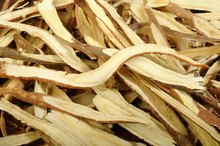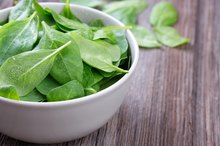Side Effects of Chlorophyll Supplements
Chlorophyll is a naturally occurring, fat-soluble, green-colored pigment found in plants. As natural chlorophyll is expensive and may be unstable in supplement form, the majority of over-the-counter chlorophyll supplements contain a synthetic, water-soluble form of chlorophyll called chlorophyllin, the Linus Pauling Institute at Oregon State University explains. These supplements may serve as an internal deodorant and may help promote wound healing. Discuss the side effects of chlorophyll supplements with your medical provider before beginning treatment.
Diarrhea or Upset Stomach
You may experience diarrhea -- frequent, loose bowel movements -- as a side effect of taking a chlorophyll supplement, Drugs.com warns. Diarrhea may also be accompanied by stomach cramps, bloating or discomfort. Seek care from your physician if you experience severe stomach pain or chronic diarrhea. Prolonged periods of diarrhea may lead to excessive fluid loss and may increase your risk of becoming dehydrated.
- You may experience diarrhea -- frequent, loose bowel movements -- as a side effect of taking a chlorophyll supplement, Drugs.com warns.
- Prolonged periods of diarrhea may lead to excessive fluid loss and may increase your risk of becoming dehydrated.
Stool or Urine Discoloration
Side Effects of the NAC Supplement
Learn More
This type of supplement may cause stools or urine discoloration as a side effect. You may notice that your stools or urine appear unusually green in color, the University of California, San Diego, reports. This side effect is normal and progressively subsides once treatment with chlorophyllin supplements ends.
Tongue Discoloration
If you take a supplement that contains chlorophyllin, you may develop tongue discoloration as a side effect of treatment, the Linus Pauling Institute explains. Your tongue may appear abnormally black or yellow in color following oral administration of this supplement. Once you complete your treatment with this supplement, your tongue will regain its normal, red coloring.
Related Articles
References
- Linus Pauling Institute at Oregon State University: Chlorophyll and Chlorophyllin - Safety
- Drugs.com: Chlorophyll
- Drugs.com: Chlorophyllin
- BeBeautiful.com. Benefits of Chlorophyll for Your Skin. By Vishwa Khare. April 29, 2018. Mumbai, Maharashtra, India: BeBeautiful [email protected] https://www.bebeautiful.in/articles/benefits-of-chlorophyll-for-your-skin
- MedlinePlus. US National Library of Medicine. Chlorophyll. 10/16/2017. Last updated 23 March 2020. Bethesda, Md.: U.S. National Library of Medicine U.S. Department of Health and Human Services National Institutes of Health 2020 https://medlineplus.gov/ency/article/002893.htm
- Linus Pauling Institute. Micronutrient Information Center. Oregon State University. Chlorophyll and Chlorophyllin. Summary. Reviewed June 2009. Corvallis, Oregon: Linus Pauling Institute Oregon State University 2020 https://lpi.oregonstate.edu/mic/dietary-factors/phytochemicals/chlorophyll-chlorophyllin
- BeBeautiful.com. Benefits of Chlorophyll for Your Skin. By Vishwa Khare. April 29, 2018. Mumbai, Maharashtra, India: BeBeautiful [email protected]
- Vaňková K, Marková I, Jašprová J, et al. Chlorophyll-Mediated Changes in the Redox Status of Pancreatic Cancer Cells Are Associated with Its Anticancer Effects. Oxid Med Cell Longev. 2018;2018:4069167. doi:10.1155/2018/4069167
- McQuistan TJ, Simonich MT, Pratt MM, et al. Cancer chemoprevention by dietary chlorophylls: a 12,000-animal dose-dose matrix biomarker and tumor study. Food Chem Toxicol. 2012;50(2):341–352. doi:10.1016/j.fct.2011.10.065
- MedlinePlus. US National Library of Medicine. Chlorophyll. 10/16/2017. Last updated 23 March 2020. Bethesda, Md.: U.S. National Library of Medicine U.S. Department of Health and Human Services National Institutes of Health 2020
- Ferruzzi MG, Blakeslee J. Digestion, absorption, and cancer preventative activity of dietary chlorophyll derivatives. Nutrition Research. 2007;27(1):1-12. doi:10.1016/j.nutres.2006.12.003
- Chimploy K, Díaz GD, Li Q, et al. E2F4 and ribonucleotide reductase mediate S-phase arrest in colon cancer cells treated with chlorophyllin. Int J Cancer. 2009;125(9):2086–2094. doi:10.1002/ijc.24559
- Yun CH, Jeong HG, Jhoun JW, Guengerich FP. Non-specific inhibition of cytochrome P450 activities by chlorophyllin in human and rat liver microsomes. Carcinogenesis. 1995;16(6):1437-1440. doi:10.1093/carcin/16.6.1437
- Yun CH, Jeong HG, Jhoun JW, Guengerich FP. Non-specific inhibition of cytochrome P450 activities by chlorophyllin in human and rat liver microsomes. Carcinogenesis. 1995;16(6):1437-1440. doi:10.1093/carcin/16.6.1437
- Xu XF, Hu JP, Cheng X, et al. Effects of sodium ferrous chlorophyll treatment on anemia of hemodialysis patients and relevant biochemical parameters. J Biol Regul Homeost Agents. 2016;30(1):135-140.
- Wangcharoen W, Phimphilai S. Chlorophyll and total phenolic contents, antioxidant activities and consumer acceptance test of processed grass drinks. J Food Sci Technol. 2016;53(12):4135–4140. doi:10.1007/s13197-016-2380-z
- Stenblom EL, Montelius C, Östbring K, et al. Supplementation by thylakoids to a high carbohydrate meal decreases feelings of hunger, elevates CCK levels and prevents postprandial hypoglycaemia in overweight women. Appetite. 2013;68:118-23. doi:10.1016/j.appet.2013.04.022
- Köhnke R, Lindqvist A, Göransson N, et al. Thylakoids suppress appetite by increasing cholecystokinin resulting in lower food intake and body weight in high-fat fed mice. Phytother Res. 2009;23(12):1778-1783. doi:10.1002/ptr.2855
- Linus Pauling Institute. Micronutrient Information Center. Oregon State University. Chlorophyll and Chlorophyllin. Summary. Reviewed June 2009. Corvallis, Oregon: Linus Pauling Institute Oregon State University 2020
Writer Bio
Rae Uddin has worked as a freelance writer and editor since 2004. She specializes in scientific journalism and medical and technical writing. Her work has appeared in various online publications. Uddin earned her Master of Science in integrated biomedical sciences with an emphasis in molecular and cellular biochemistry from the University of Kentucky College of Medicine.









